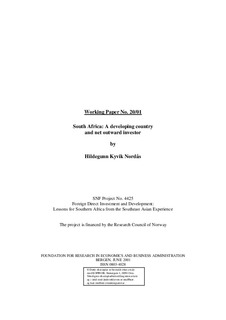South Africa : a developing country and net outward investor
Working paper

Åpne
Permanent lenke
http://hdl.handle.net/11250/165970Utgivelsesdato
2001-06Metadata
Vis full innførselSamlinger
- Working papers (SNF) [809]
Sammendrag
South Africa is not an emerging market in the sense that modern industries are established in the country for the first time. Rather, South Africa is in transition from a mature, mineral-led and inward-looking economy to an outward-looking economy. A major problem in the transition process is that the country is relatively abundant in unskilled labor, but has difficulties in establishing competitive labor-intensive industries. Thus, the industrial sector is relatively capital-intensive and there is a gap between the productivity level and corresponding wage rate in existing industries and the productivity level of the presently unemployed. The paper describes and analyses the role of foreign direct investment (FDI) in South Africa's industrial development. Inward FDI played an important role for early developments in the financial and manufacturing sectors, but during the past two decades outward investment has outpaced inward investment. Both inward and outward investments (except outward investment in the SADC region) have largely been in the form of mergers and acquisitions. This may lead to integration of South African companies in international supply networks, but it does not create jobs in the short run. The major factors limiting FDI inflows are probably shortage of skills, inflexible labor markets, a relatively small and slowly growing domestic and regional market and a highly concentrated ownership structure in the South African economy. The post-election euphoria has not been sufficient to provide the "big push" towards sustained growth. The Asian crisis was an untimely setback although South Africa weathered the storm largely due to its sound financial sector. Even in the absence of this setback, however, the gap between domestic savings and the investment rate necessary to generate growth at around 5-6 percent or more is too wide to be filled by FDI.
Utgiver
SNFSerie
Working Paper2001:20